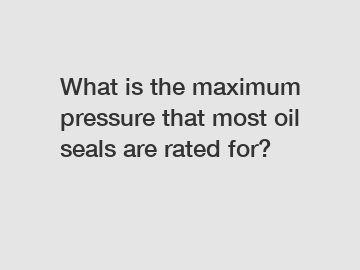What is the maximum pressure that most oil seals are rated for?
What is the Maximum Pressure That Most Oil Seals Are Rated For?
Oil seals are a critical component used in machinery and equipment to prevent the leakage of lubricants and fluids. They ensure the proper functioning and longevity of various equipment, such as engines, gearboxes, and hydraulic systems. When designing or selecting an oil seal, it is essential to consider its maximum pressure rating to ensure optimal performance and prevent damage or failure. In this article, we will delve into the maximum pressure that most oil seals are rated for, highlighting its importance and implications.
Understanding Oil Seals:

Before discussing the maximum pressure rating of oil seals, it is crucial to understand what they are and how they function. Oil seals, also known as rotary shaft seals, are mechanical devices used to prevent the ingress or egress of fluids along a rotating shaft. They consist of a flexible outer casing, a sealing lip, and a metal reinforcing ring. The sealing lip typically made of rubber or other elastomers creates a barrier that prevents fluid leakage while allowing the rotary motion of the shaft.
Importance of Maximum Pressure Rating:
The maximum pressure rating of an oil seal refers to the highest pressure at which it can effectively retain fluids without leakage or damage. It is critical to consider this rating, as operating an oil seal beyond its maximum pressure limit can lead to catastrophic failure, compromised functionality, and potential damage to other components. The pressure rating is influenced by various factors, including the seal's design, material composition, and application requirements.
Factors Influencing Maximum Pressure Rating:
1. Seal Design: The design of the oil seal plays a significant role in determining its maximum pressure rating. The lip's geometry, size, and flexibility are crucial factors. Additionally, the presence of a metal reinforcing ring provides rigidity, ensuring that the seal can withstand higher pressures.
2. Material Composition: The choice of materials used in manufacturing the oil seal greatly affects its pressure rating. Different elastomers have varying levels of resilience, chemical resistance, and structural integrity, making them suitable for different pressure ranges. Common elastomers used in oil seals include nitrile rubber (NBR), fluoroelastomers (FKM), and Silicone (VMQ).
3. Application Requirements: The maximum pressure that an oil seal can handle is also influenced by the application's specific requirements. Factors such as temperature, speed, and type of fluid being sealed can affect the seal's performance and determine its pressure limitation.
Determining the Maximum Pressure Rating:
Oil seal manufacturers perform rigorous testing to determine the maximum pressure rating of their products. These tests involve subjecting the seals to controlled pressure conditions and measuring any fluid leakage or structural deformation. The results provide valuable information to engineers, helping them select the most appropriate seal for their applications.
Conclusion:
In conclusion, the maximum pressure rating of oil seals is a critical consideration when selecting or designing a sealing solution. It determines the threshold at which the seal can effectively retain fluids without leakage or damage. Factors like seal design, material composition, and application requirements influence this rating. By understanding the maximum pressure rating of oil seals and selecting suitable options, engineers can ensure the reliability, longevity, and optimal performance of their machinery and equipment.
For more information about oil seals or to discuss your specific sealing requirements, please feel free to contact us.
Contact us to discuss your requirements of end-face mechanical seal, end face mechanical seal, high pressure hydraulic seals. Our experienced sales team can help you identify the options that best suit your needs.
167
0
0


Comments
All Comments (0)